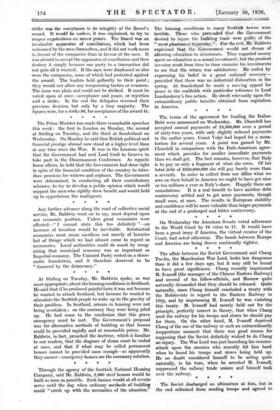The affair between the Soviet Government and Chang Tso-lin, the
Manchurian War Lord, looks less dangerous than it did a few days ago, but it may still be found to have great significance. Chang recently imprisoned M. Ivanoff (the manager of the Chinese Eastern Railway) and several of his fellow-officials, and Moscow quite naturally demanded that they should be released. Quite naturally, since Chang himself concluded a treaty with the Bolshevists in regard to the Eastern Railway in 1924, and by imprisoning M. Ivanoff he was violating this treaty. M. Ivanoff had merely held out for the principle, perfectly correct in theory, that when Chang used the railway for his troops and stores he should pay for them. On the other hand, M. Ivanoff deprived Chang of the use of the railway at such an extraordinarily "inopportune moment that there was good reason for supposing that the Soviet definitely wished to do Chang an injury. The War Lord was just launching his counter- attack upon the enemies who recently hit him hard when he found his troops and stores being held up. He no doubt considered himself to be acting quite naturally, in his turn, when he arrested M. Ivanoff, Suppressed the railway trade unions and himself took over the railway.


















































 Previous page
Previous page